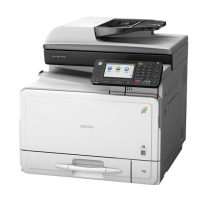No FUNCTION COMMENTS
0
Communication after the Journal
data storage area has become full
0: Impossible
1: Possible
0: When this switch is on and the journal history becomes
full, the next report prints. If the journal history is not
deleted, the next transmission cannot be received. This
prevents overwriting communication records before the
machine can print them.
1: If the buffer memory of the communication records for
the Journal is full, fax communications are still possible.
But the machine will overwrite the oldest communication
records.
Note: This setting is effective only when Automatic Journal
printout is enabled but the machine cannot print the report
(e.g., no paper).
1
Action when the SAF memory has
become full during scanning
0: The current page is erased.
1: The entire file is erased.
0: If the SAF memory becomes full during scanning, the
successfully scanned pages are transmitted.
1: If the SAF memory becomes full during scanning, the
file is erased and no pages are transmitted.
This bit switch is ignored for parallel memory transmission.
2
RTI/CSI display priority
0: RTI 1: CSI
This bit determines which identifier, RTI or CSI, is
displayed on the LCD while the machine is
communicating in G3 non-standard mode.
3
File No. printing
0: Enabled
1: Disabled
1: File numbers are not printed on any reports.
4
Action when authorized reception
is enabled but authorized RTIs/
CSIs are not yet programmed
0: All fax reception is disabled
1: Faxes can be received if the
sender has an RTI or CSI
If authorized reception is enabled but the user has stored
no acceptable sender RTIs or CSIs, the machine will not
be able to receive any fax messages.
If the customer wishes to receive messages from any
sender that includes an RTI or CSI, and to block messages
from senders that do not include an RTI or CSI, change
this bit to “1”, then enable Authorized Reception.
Otherwise, keep this bit at “0 (default setting)”.
5-7 Not used Do not change the settings
System Switch 1F [SP No. 1-101-032]
Bit Switches
203

